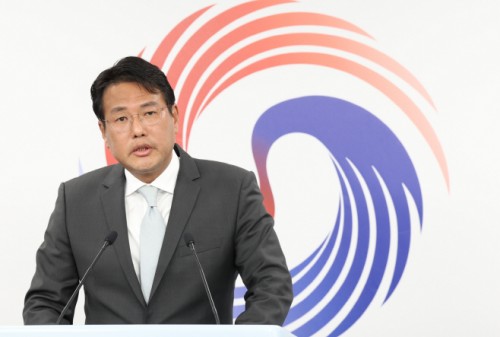 |
| Kim Tae-hyo, first deputy chief of the presidential National Security Office, gives a press briefing at the presidential office in Seoul on May 18, 2022./ Source: Yonhap News |
AsiaToday reporter Lee Wook-jae
South Korean President Yoon Suk-yeol and U.S. President Joe Biden will hold a summit on Saturday and plan to agree on a technological alliance, in addition to their bilateral military and economic alliance.
“The alliance vision for the upcoming summit is to establish the Korea-U.S. alliance as the central axis for building and strengthening peace and prosperity in East Asia and the world,” said Kim Tae-hyo, first deputy chief of the presidential National Security Office, during a press briefing at the presidential office in Yongsan on Wednesday.
“The military alliance that has been maintained over the years based on a value alliance expanded to an economic alliance through the Korea-US FTA. We anticipate that the Korea-U.S. technology alliance will be added at the summit,” Kim said.
It is aimed at broadening the scope of the Korea-U.S. alliance by adding technology alliance, which strengthens cooperation in high-tech fields, such as semiconductors, batteries, eco-friendly green technology, and artificial intelligence, to the existing alliance focused on military and economy. In the high-tech field, South Korea and the United States have the upper hand in supply chain and design fields, respectively. Both countries agree that the technology alliance will lead to market expansion and job creation.
In addition, Yoon will attend the summit meeting to declare the launch of the U.S.-led Indo-Pacific Economic Framework (IPEF) which will be held in Japan on May 24.
South Korea will officially participate in the IPEF as a launching member. In addition to South Korea, eight countries have expressed their intention to attend, including Japan, Australia, New Zealand, Singapore, the Philippines, and Malaysia.
The IPEF is often considered a countermeasure to the Chinese-led Regional Comprehensive Economic Partnership (RCEP), raising concerns over possible diplomatic and economic conflict with China. In fact, Chinese Foreign Minister Wang Yi expressed dissatisfaction in the recent virtual meeting with South Korean counterpart Park Jin, saying, “We oppose the negative tendency of decoupling and cutting off chains, and maintain stability and smoothness of the global industrial and supply chains.”
However, the presidential office made it clear that the move was not against China. “There is no need to view the IPEF simply as a hostile decoupling between great powers. It’s not against China. There is already a Korea-China FTA, and a follow-up agreement is being discussed,” Kim said.
#Yoon Suk-yeol #Joe Biden #technology alliance
Copyright by Asiatoday
Most Read
-
1
-
2
-
3
-
4
-
5
-
6
-
7





















